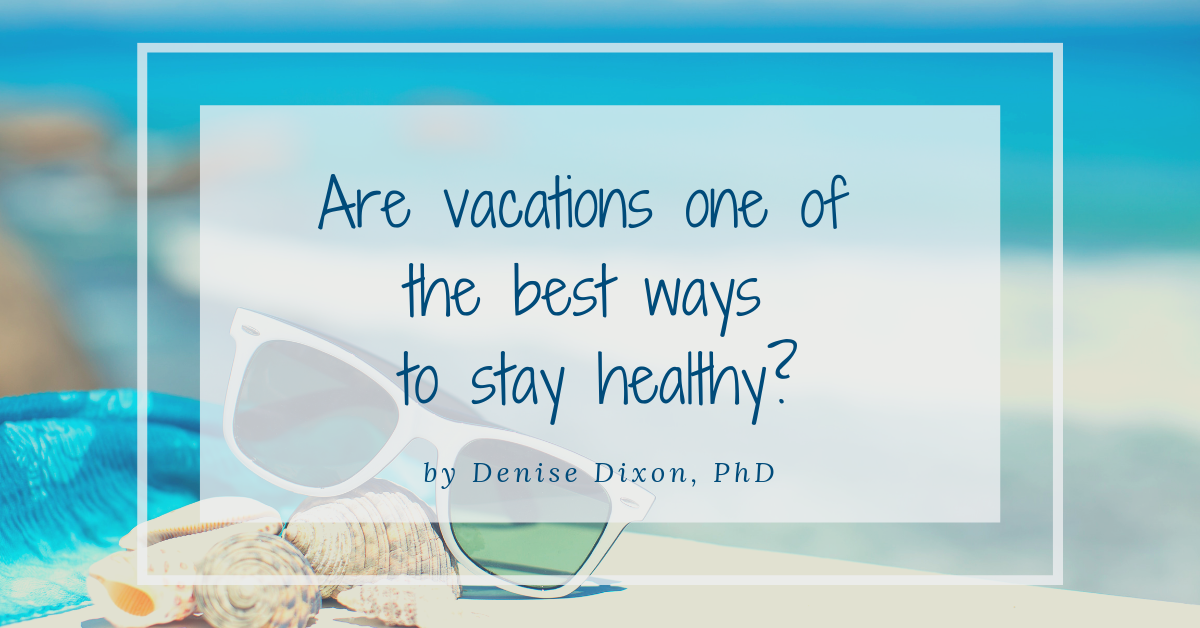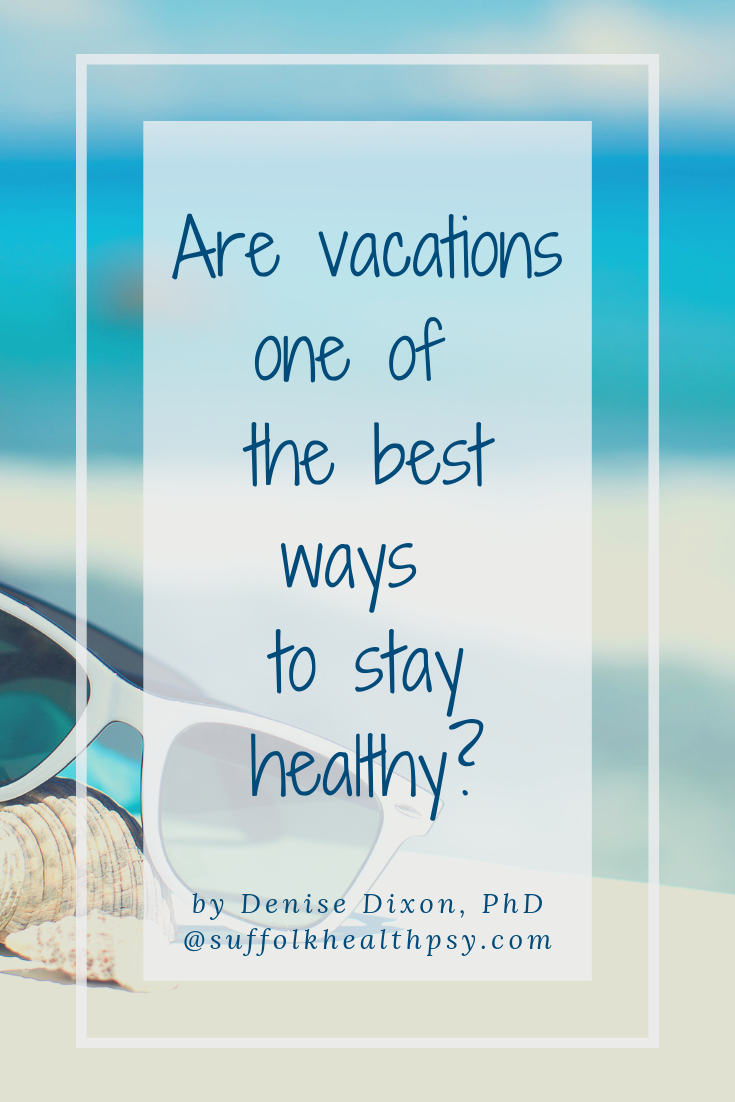- request time off (at least 6 months in advance) – check!
- purchase new luggage (sweet!) – check!
- renew previously expired passports – check!
- assess clothing requirements (horse-back riding on Grand Cayman? Time to dig out my riding boots. Yay!) — working on it!
- arrange dog care? – check! (thanks to our beautiful cousin!)
Yes, I love planning for vacations — almost as much as I love good science. Okay, so maybe that’s a close tie… Of course, I wanted to combine these two loves, so I asked myself:
What is the science behind the benefits of taking vacation?
Fortunately, there is a fair amount of decent research, on the matter. Let’s start, by asking ourselves the following questions:
- Are we one of the 75% Americans that does not use all of our vacation time each year?
- Or, are we one of the 42% of Americans that does not take any vacation time off each year?
- How about one of the 61% of Americans that works, while on vacation?
By now, we may be wondering, “What’s the big deal, if we don’t take vacation?”
Actually, quite a bit! First, let’s take note of the research, that has shown that employers benefit (when their employees take their paid vacation leave), in the following ways:
- higher employee productivity
- greater employee retention
- stronger workplace morale
This knowledge may allay any concerns amongst “workaholics,” by reminding us, that taking paid leave is actually good for our places of employment.
Now that we’ve cleared that concern, we may find ourselves curious about the effects of taking our vacation time — is vacation really good, for us?
The short answer: Yes, sir-ee, baby! (Don’t you say maybe!) Taking paid vacation leave has been shown to benefits employees by:
-
Reducing stress
[tweet_dis]Several studies have shown that vacations help to lower stress — by getting us away from the people, places, things, and situations — that we find stressful.[/tweet_dis]
Here’s something to consider: this stress reduction is not just temporary, but lasts well after we return home from vacation.
Another benefit: [tweet_dis]after taking time off from work, vacationers have described fewer stress-related physical complaints, such as headaches, backaches, and heart irregularities for the five weeks after returning home.[/tweet_dis]
Now, that’s awesome!
-
Improving overall mental health
Some studies have found that [tweet_dis]leisure time activities, including vacations, are associated with increased positive emotions; energy levels; general life satisfaction; and improved sense of feeling healthy overall.[/tweet_dis]
People who vacation at least once per year, have also been found with decreased negative feelings, such as tension, anxiety and depression.
Sounds good, so far, right? RELATED: 7 easy steps to find the right psychologist for you
-
Preventing heart disease
Many different studies have emphasized that taking a vacations improves cardiovascular health. In one study, [tweet_dis]men (who were at risk for heart disease) that skipped vacations for five consecutive years were 32 percent more likely to suffer heart attacks than those who took at least a week off each year.[/tweet_dis]
Other studies have shown similar results with women. [tweet_dis] Women who did not take any vacation time during a six year period were nearly eight times more likely to develop heart disease, have a heart attack, or die of a coronary-related cause than women who took at least two vacations each year.[/tweet_dis]
Taking vacations is good for our hearts!
-
Enhancing relationships
One five-year study showed that women who take vacations at least twice yearly reported higher levels of marital satisfaction; and that not taking vacations decreased satisfaction with their marriages.
Other research has shown that [tweet_dis]families that vacationed together showed increased well-being and general satisfaction with their relationships.[/tweet_dis] The authors stated that the shared experiences; communication; escape; relaxation; and experiential learning contributed to their positive relationship growth.
-
Improving sleep
Some studies have shown that [tweet_dis] vacations improved overall sleep by interrupting habits that disrupt sleep, like working late into the night, or watching a backlit screen before bed.[/tweet_dis]
Vacations also provide a much-needed respite from the stress of our day-to-day lives (as mentioned above).
Of course, vacations that provide the chance to be more physically active while outdoors, promote restful slumber!
[tweet_box design=”box_11″ float=”none”]The take home message: taking time off is important for our health! [/tweet_box]
A few more questions about vacations, to consider:
- Do the types of vacation activities make a difference?
- How about where we vacation?
Yes, of course! Several studies have shown that [tweet_dis]exercising, getting good sleep, making new acquaintances, and taking free time for one’s self was associated with feeling well-recuperated, especially when vacations were taken in warmer (and sunnier) locations.[/tweet_dis] RELATED: Four fitness apps that you want to download right now On the flip side, vacationers felt more exhausted when experiencing vacation-related health problems and greater time-zone differences to locations that were not sunnier or warmer than home. RELATED: What are the winter blues, and how to I know if I have it?
Another reason why investing in vacations is a good idea:
Some very interesting research has shown that [tweet_dis]planning for, experiencing, and then reminiscing about vacations extend the level of satisfaction and happiness that we feel over the course of those accumulated moments.[/tweet_dis] Sounds like an excellent return on investment, to me! Now, if you’ll please excuse me, I think that I will go pack…
Yes, vacations are good for our health!
– Denise Dixon, PhD @suffolkhealthpsy.com
References and Resources:
Would you like to read the reference articles for this blog post, or see additional vacation and travel resources? If yes, then click here for links to references for this blog post, and here to access additional links and resources.
RELATED: What are the best ways to feel better, if I have Seasonal Affective Disorder?
UP NEXT: Awesome social media automation tools for solopreneurs
YOUR TURN:
Do you have a suggestion for a blog post?
I’d love to hear from you! Simply click here to tell me all about your idea. Thank you!
Purchase links provide a very small affiliate commission, without any extra cost to you.






0 Comments